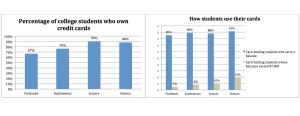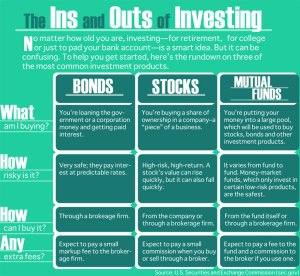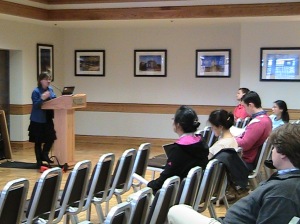For liberal-arts majors, finding the dream job takes time, perseverance
History major Nicole Peterson has dreams of working in a library or archive somewhere, but after the University of Kansas senior graduates this spring, she’ll be working as far away from her dream job as she can imagine: at a cubicle in a small insurance company’s office.
“I have a customer-service job at this insurance company in Leawood, [Kan.,] so it’s not really using my degree,” Peterson said. “Ideally I want to use my major, but I don’t really know how.”
Peterson says she’s not the only one at KU’s College of Liberal Arts and Sciences who can’t find work doing what she loves; many of her friends are struggling to find a career, as well. She said she thinks much of the difficulty of the liberal-arts job search comes from the lack of a clear career track to follow.
“A lot of the career websites like CareerBuilder don’t have, for example, a ‘History’ place to look, or ‘Communications,’” Peterson said. “It’s not like that. A lot of the time, the jobs open are in human resources or something I’m not really qualified for.”
While the job market for college students in general is improving, much of this improvement is due to increasing demand for students in high-tech and career-oriented fields of study such as engineering, healthcare and business. Many liberal-arts graduates like Peterson are struggling to find stable employment and figure out where their degrees fit in in the world of work.
A liberal-arts program may teach specific skills, such as languages and methods of criticism. But the real asset such an education provides, according to Ann Cudd, KU’s Associate Dean for the Humanities, is the ability to think differently.
“Employers are not necessarily looking for people who have a particular vocational skill for their particular job, but rather people who can think critically, write well and use basic statistical analyses and data analyses to solve problems,” Cudd said. “Those are the things that we teach liberal-arts-and-sciences graduates.”
But even though these skills are useful for employers, they don’t lend themselves to a smooth search for a career. Larry Fillian, director of the Student Academic Services office in KU’s College of Liberal Arts and Sciences, said the large umbrella category of “liberal-arts” skills can make the pool of job prospects broader and more daunting for liberal-arts graduates.
“Students [in career-oriented majors] need to have a solid knowledge of the technical skills required for those occupations, and therefore I would expect them to have a more directed and niched job search than perhaps a liberal-arts student would,” Fillian said.
This lack of specific skills can also make the job search more maddening for liberal-arts majors. According to Craig Warlick, a career counselor with KU’s Career Center, this means liberal-arts students often have to take jobs that are low on the totem pole and only tangentially related to their majors when they first start out.
“Generally, a lot of liberal-arts students have to take more of an entry-level position with certain things, because while they may have the tools, they may not necessarily have the experience,” Warlick said.
This doesn’t mean liberal-arts majors should give up hope on finding their ideal careers. The key to landing a dream job with a liberal arts degree, Warlick said, is to start out with lower expectations and climb the corporate ladder.
“Be patient and be persistent,” Warlick said. “Rarely do any of us get our ideal job, especially straight out of school, but if a company is solid, the environment is people you enjoy working with and the task is something you find somewhat rewarding, just take it. That might not be your ideal job, but it might be your ideal beginning job.”
Nicole Peterson said she isn’t sure if she can get to her ideal job from where she’s at, and she’s planning to go back to school for a graduate degree in history once she’s saved enough money for tuition. But she also said her new job isn’t totally unrelated to the skills she learned in her history classes.
“It’s customer service, so I’m going to be answering a lot of phones and a lot of questions that people are going to have, and since I’ve done so much research, I’ll be able to do that, if needed,” Peterson said. “Then again, I don’t know how much research I’m going to need to answer a question about somebody’s insurance, but I will use the critical thinking and being able to think quickly and provide useful answers in a concise way.”
What jobs do liberal-arts majors look for?
Even though a liberal-arts education tries to provide students a broad base of knowledge that they can apply to whatever field they go into, there are some careers that students in the liberal arts are more attracted to. Compared to their counterparts in career-oriented majors, liberal-arts students are less likely to look for jobs in high-pressure fields like business and healthcare and more likely to gravitate toward careers in education.
The career-counseling process
Many liberal-arts students use career counseling services to help find employment. University of Kansas career counselor Craig Warlick, the majority of whose counseling assignments are liberal-arts majors, discusses the unique challenges associated with counseling these students.
Sylas May: “University of Kansas career counselor Craig Warlick says well-counseled students in the liberal arts can do just as well on the job market as students in career-oriented fields of study like engineering or business.”
Craig Warlick: “There’s a lot of data out there that says liberal-arts students typically rise much faster than people even in more of those career-track majors.”
Sylas May: “The trick, he says, is helping them figure out what they have to offer.”
Craig Warlick: “I was a double major—history and English—and now I’m getting my Ph.D. in counseling psychology, so I’m like a child of the liberal arts. And the thing that we really try and focus on is really, ‘What skills do you have?’ Like, for instance, if you’re a history major, yes, there is a direct pipeline for teaching and for law and for politics that way, but also, what other skills do you have? A lot of those things are going to be like the ability to research, the ability to process large quantities of information, the ability to write, probably the ability—especially by the time you’re graduating, you’ve probably done several presentations, so you’re probably a pretty decent public speaker. Companies really do look for those types of people.”
Sylas May: “For The Savings Scholar, I’m Sylas May.”



